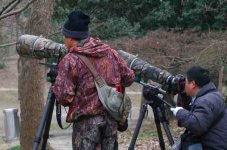Cocorico
Active member
Hello all,
I am fairly new on the forum. As I mentioned before, I have liked watching birds for a few years now, but really got into what you would call birdwatching (i.e. trying to ID, having a field book, etc...) only recently. Now I know I have to probably do more birding trips than I am currently, but whenever I am out and about, or even when I go to the meadow or along the river, I always keep my eyes and ears open...BUT... it seems that I am never on the right spot at the right time I mean I see some birds, but most common ones. I have small bins and just ordered a scope for Xmas
I mean I see some birds, but most common ones. I have small bins and just ordered a scope for Xmas  so hopefully this will help but I know that equipment is important but not sufficient if you don't have a good technique like in any other field.
so hopefully this will help but I know that equipment is important but not sufficient if you don't have a good technique like in any other field.
I check local blogs to learn what I should be seeing (maybe it's a question of IDying birds...) but still no luck. Am I going out birding at the wrong time of the day? Is it really a must to go far to see new species? I don't think so but I'd really like your experts' advice on how to improve my birding!
I am enjoying it though, but I'd be enjoying it even more if I saw new species!!
Thanks!
Marianne
I am fairly new on the forum. As I mentioned before, I have liked watching birds for a few years now, but really got into what you would call birdwatching (i.e. trying to ID, having a field book, etc...) only recently. Now I know I have to probably do more birding trips than I am currently, but whenever I am out and about, or even when I go to the meadow or along the river, I always keep my eyes and ears open...BUT... it seems that I am never on the right spot at the right time
I check local blogs to learn what I should be seeing (maybe it's a question of IDying birds...) but still no luck. Am I going out birding at the wrong time of the day? Is it really a must to go far to see new species? I don't think so but I'd really like your experts' advice on how to improve my birding!
I am enjoying it though, but I'd be enjoying it even more if I saw new species!!
Thanks!
Marianne





